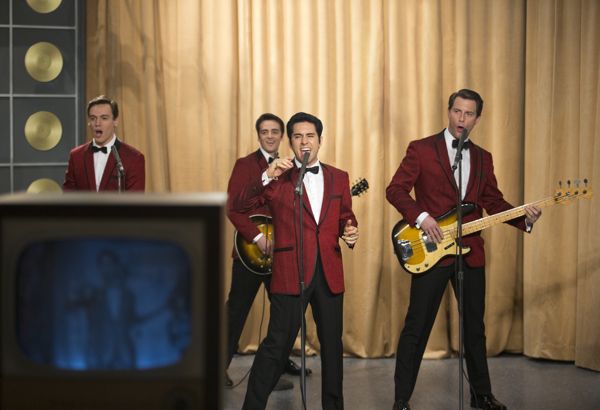
Jersey Boys feels like two genre films mashed together.
There’s the “old neighborhood” genre: usually a coming of age story about a decent young man potentially corrupted by criminal forces in his working class town. (See Mean Streets, Rounders, A Bronx Tale, et al). Often in those stories, there is a wayward best friend who our hero loves but can’t quite control.
The other is the rags-to-riches musician story, from which you can take your pick.
Both genres are sturdy, reliable, and a little square. And Clint Eastwood, in adapting the popular Broadway musical about the rise of the Four Seasons, does little to make them his own (how he managed to avoid that old trope of a time lapse as the first hit rises up the charts is a mystery)—but is that necessarily a bad thing?
There’s something comforting and pleasant about watching Jersey Boys. Even if you haven’t seen the musical (or know nothing about the Four Seasons), you know exactly where this story is going.
When we first meet Frankie Valli (honey-voiced John Lloyd Young, who won a Tony for playing the same part on Broadway) he’s a gentle-natured apprentice at a barber shop who has already been taken under the wing of the local mob boss Gyp DeCarlo (Christopher Walken, as ever, doing the world’s best Christopher Walken impression). His best friend Tommy (Vincent Piazza) is a hustler and small time crook, who plays in a band. Tommy’s the one who first recognizes that Frankie’s voice, with its uncanny falsetto, is a unique and marketable gift. Frankie joins the band, which also includes the dim but likeable Nick (Michael Lomenda), but things really don’t take off until they partner with songwriter and keyboardist Bob Gaudio (Erich Bergen), who is ambitious and not from the neighborhood and doesn’t quite understand Tommy’s hold over Frankie.
The story, of burgeoning fame and how Tommy’s implosion nearly ruins them all, is told by each member of the band directly addressing the camera, a technique that worked better in the play, where artifice can blend more seamlessly with realism.
As with the show, one of the keys to the film’s success is the music. Just when you think they’ve run out of Four Seasons hits, Gaudio sits behind the piano and group begins jamming on the early strains of “Walk Like a Man.” The Four Seasons really did have an impressive run.
Some parts of the film work better than others. I loved a few of the early scenes when the band is first forming, like one when the group breaks into a church to use the organ after hours. I also enjoyed Mike Doyle as Bob Crewe, the record label exec whose flamboyant persona belied a nearly ruthless pragmatism. And Piazza brings a live-wire, combustible energy to his role as Tommy; you can see why Frankie is loyal to him—he has an undeniable charisma.
The women, sadly, get less care and attention. Frankie’s wife goes quickly from being an object of desire to a shrill nagger. And the scenes between Frankie and his troubled daughter feel inorganic, practically tacked on.
With a running time of 134 minutes, the film almost begins to drag. But by the very end, when Eastwood brings out the cast, curtain-call style for an encore of “Oh What a Night,” the audience feels cheered and satisfied. Nope, Eastwood hasn’t reinvented the wheel here. He’s just given us one that’s well-oiled—and more than capable of taking us where we need to go.
